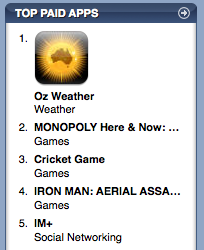Why your website might be no more than a magic bean. http://ow.ly/pVYdp
Why your website might be no more than a
19 10 2013Comments : Leave a Comment »
Categories : Uncategorized
Twitter is as boring as…? Yup, Twitter
15 10 2013Twitter is as boring as…? Yup, Twitter can be banal but so can the phone, so that’s no excuse not to learn. http://ow.ly/pMHDa
Comments : Leave a Comment »
Categories : Uncategorized
All the fun of “citizen journalism” with none of the ethics and responsibility
19 02 2009

This type of arson is wrong, too.
Popular social networking strategist and commentator Laurel Papworth was fairly well savaged on Sunrise this week by its hosts and David Galbally QC. I’ve a lot to say about the standard of debate on Sunrise but snideness aside: discussing controlling content on a network like Facebook requires at least an understanding of what Facebook is. David Galbally might be second only in eminence to his father as a criminal lawyer but it appeared that what he understands about Facebook could be etched on a small pair of handcuffs.
Even the conversation was badly billed. Taking down Facebook posts about an alleged arsonist is not about the arsonist’s “online privacy”, it’s about his right to a fair trial.
The Silicon Federation blog has already taken Sunrise to task for asking the wrong questions. Asking the right questions would have been the start of a better discussion.

But was either side asking the right questions?
Laurel has subsequently posted:
“So calls to turn Facebook off in Victoria or to insist Facebook removes photots and videos and material relating to alleged suspects is [naive] at best. Irrespective [of] what the courts say.”
Respectfully (and I wouldn’t approach @SilkCharm any other way), that’s not the point either.
The point remains an accused person’s right to a fair trial. She is absolutely right that it is ludicrous to expect Facebook even to be aware of every trial in every jurisdiction in the world with internet access. It boggles the mind to suggest that, once it had amassed this legal knowledge, Facebook could or should filter every post that might touch on a matter. I wonder if Galbally is envisaging an unimaginable number of human editors or an algorithm so sophisticated one’s mind would snap just thinking about it.
But it is not ludicrous to expect individuals in the appropriate jurisdiction to obey the law or face the consequences. Sites like Facebook link every activity to a user so it is possible to find and prosecute an individual, even if you couldn’t get Facebook to do anything about it. Sure, the long arm of the law won’t catch everyone, but a high profile contempt case for a ringleader on Facebook would send a message.
Of course there are sites that allow anonymity and the activity might move “underground”, as criminal activity often does; of course you can’t catch everyone; of course people posting outside Australia wouldn’t be breaking the law; but to admit defeat because you can’t prosecute everyone is like saying Coles might as well start selling booze, porn and drugs to kids because they’ll always be able to get their hands on them anyway.
As a community — the word that trips most easily off the lips of all who talk Web 2.0 — we have decided on certain standards of justice. If we want something different, it should be we who decide it, not Facebook and its TOS (cf argument on the Silicon Federation blog).
Laurel goes on to write about the 88,000 webpages referencing her:
“How many links will I have in another 3 years? A million? And what about the upcoming generation? Removing their baby photos, graduation videos whenever they end up in court? The photos their relatives and friends and strangers have taken? Even if YOU don’t use Facebook, someone in your social network does – betcha they have a birthday party photo with you in it.”
But who is asking that the arsonist’s baby photos be removed? No one. If the alleged arsonist had been written about in the newspapers for winning a gymkhana as a child or as chairman of last year’s fete committee, no one would be asking them to purge their archives. The request to Facebook, according to the Age, was aimed at “Facebook vigilantes” who published the alleged arsonist’s photo and address after the charges were laid and because they were “frustrated at a court order protecting him”.
That is an altogether different beast than trying to erase information innocently published about this about this man before he became an accused arsonist. This was a court-ordered request to prevent a lynching and must be obeyed by us all, regardless of Facebook’s stance.
Liability here is at the very least on the individual and if individuals think Facebook will be the only target of lawyers, they’re in for the rudest shock.
This is the age of the citizen journalist and his and her new responsibilities.
BTW if you’re in any doubt that we’re all journalists now, see the row in the comments section of the Silicon Federation post on this, where one of Melissa Doyle’s assistants insists she is a journalist. If chatting about the events of the day is journalism, we’re certainly all journalists now online and off.
Comments : 16 Comments »
Tags: #bushfires, Arson, Court order, David Galbally, Facebook, Laurel Papworth, Melissa Doyle, Silicon Federation, Sunrise
Categories : Uncategorized
BBC falls into Creative Commons “trap”
12 02 2009
Last month I wrote about people using Flickr images under Creative Commons licences because it’s the cool Web 2.0 thing to do, even though some CC licences prohibit commercial uses. The BBC has just been stung for doing just that.
This stuff isn’t complicated: if you don’t own it, don’t put it on your website unless you have permission directly from the owner or under the licence the owner has attached to the content. (If the owner hasn’t specified a licence, the material is automatically copyright pr
Maybe when Kate and her Silicon Federation have finished with their Entering the Mobile Ecosytem seminar, they need to hold one on what goes and what doesn’t in Web 2.0.
BBC story via jemimakiss.
Comments : 1 Comment »
Tags: BBC, Copyright, Creative Commons
Categories : Uncategorized
More Australian iPhone apps, please
6 02 2009

OzWeather one but only 😦
My friend and erstwhile collaborator, Kate Carruthers, is organising a seminar for companies thinking about developing an Australian iPhone app through her Silicon Federation. And it’s not a moment too soon. I can’t call it a disappointment because nothing disappoints me about my iPhone but I would like more Australian content. Within less than a day of iPhone ownership I’d downloaded Graham Dawson’s brilliant OzWeather app, which takes data from the Australian Bureau of Meteorology. Then I stalled: there wasn’t any other great local stuff to install. And I’m still stalled!
Westpac has an app that helps customers find its ATMs but are ATMs really that hard to find? What about one that helps me with my banking, finances, expenses or something? Kraft in the US has managed to convince customers to buy an app that recommends Kraft products. This is a platform that could make you money, corporate Australia, as well as entertaining me.
Graham Dawson is going to be speaking at the seminar and Kate promises it is going to be practical information, giving marketing/technology types the information they need to get on with building something I’d like to have on my iPhone — who to speak to, what needs to be done, what’s hard, what’s easy, and how to be successful.
I wish I had a cool discount code to give you but I forgot to ask. I know there’s some super-duper-early-bird special on at the moment so book now.
Comments : 2 Comments »
Tags: Australia, Graham Dawson, iPhone app, Kate Carruthers, OzWeather, Silicon Federation
Categories : Uncategorized
Are you too funky for copyright law?
28 01 2009 Recently I went to a presentation by some international PR-types. Their PowerPoint was liberally punctuated with pictures attributed to Flickr users.
Recently I went to a presentation by some international PR-types. Their PowerPoint was liberally punctuated with pictures attributed to Flickr users.
This is what funky Web 2.0 people do: they search Flickr for an image released under a Creative Commons licence. This gives them a double jolt: they get free pictures to jazz up their slides; and they put their webcred on their sleeves. Look-it ,I get the whole Web 2.0 sharing –but-respecting culture. Using this cool new Creative Commons thing, I outwit the Man and his repressive anti-creative laws. Look at the crowd sourcing the solution. So long as I tip my hat to the photographer, I’m on the right side of the law.
Probably not.
Many (most?) Flickr users who licence their content using Creative Commons choose the Attribution-Noncommercial-Share Alike licence. To comply with this licence, the Funky Bunch needs to meet the three requirements neatly spelled out in the name: attribute (tick), allow others to use the image on the same terms (sure thing), and use it only for non-commercial purposes. Uh oh. You’re a professional PR person giving a presentation highlighting your services to a room full of paying potential customers. You just out-funked yourself.
Creative Commons is a wonderful thing but it still gives the licensor (the photographer, in the case of Flickr) rights. It is not the same as copyright-free.
The photo in this post <dusting off webcred on sleeve> is by Andy Piper, who provides it under the CC Attribution-No Derivative Works licence.
Comments : 4 Comments »
Tags: Creative Commons
Categories : Uncategorized
How to uninstall and clean out TweetDeck on Mac OS X
23 09 2008I love TweetDeck, the Twitter client. Unambiguously. It has become one of those applications in the “lights out” category: when it stops working, it’s like someone’s turned the lights out. Yesterday it simply dumped tweets and stopped refreshing, keeping a handful of replies but otherwise showing blank columns.
 Using a combination of advice from the old TweetDeck blog, a blog to which it pointed, and something from @chopso, here’s what I did:
Using a combination of advice from the old TweetDeck blog, a blog to which it pointed, and something from @chopso, here’s what I did:
- Uninstalled TweetDeck,
- Uninstalled Adobe AIR using the uninstaller in the Applications folder
- Deleted the folder home/Library/Preferences/TweetDeck (a vital step I couldn’t find anywhere online but given to me on Twitter by @chopso)
- Restarted the computer
- Reinstalled TweetDeck
I suspect that was overkill and I would have got the same result:
- Closing TweetDeck
- Deleting the folder home/Library/Adobe/AIR/ELS/TweetDeck*
- Deleting the folder home/Library/Preferences/TweetDeck
- Restarting TweetDeck
I don’t normally write “support” posts (unqualified to do so) but because I couldn’t find the @chopso step anywhere and it was vital to my success in getting TweetDeck working again, I thought I’d put this up.
Comments : 11 Comments »
Tags: TweetDeck, Uninstall
Categories : Uncategorized
What do you call 900 lawyers on Twitter?
23 09 2008A good start!
In the wonderful, organic way that is Twitter, somehow I ended up following @paulmckeon, which led me to find that he was tweeting for the law firm Deacons (@Deacons). They’ve a FriendFeed, too, and social bookmarking buttons on their news items. On his blog, Paul writes about video podcasting for law firms.
![]()
This 2.0 thinking is impressive for an Australian outfit full stop, let alone a law firm. Back in the day when I was helping with PR for Clayton Utz, it was a big deal to get them to consider for a moment that there was more to PR than debasing themselves applying for cornflakes-box awards from the trade press. (They were quickly overcome by the possibility of winning a shiny thing.)
To have got them online as part of the conversation as much as Deacons is would have been impossible. Even a couple of years later as an external consultant, I tried talking to Clayton Utz and other law firms but hit a brick wall: they were happy mailing out newsletters written by clerks in the names of partners (some of the more cutting edge places were emailing newsletters). This was as much “value” as they were prepared to “add”.
If law firms can embrace these new communications media and understand the benefits of talking with, not at, their clients, why not other conservative organisations like, oh, I don’t know, financial services providers?
Comments : 5 Comments »
Tags: Clayton Utz, Deacons, FriendFeed, Law firm, Twitter
Categories : Uncategorized
If you’re not blogging, you’re an idiot
22 09 2008Tom Peters, Management Consultant
“If you’re not blogging, you’re an idiot,” management uber-guru Tom Peters told hundreds of attendees at the 27th annual Inc. 5000 conference in Washington DC. “No single thing in the last 15 years has been more important to me professionally than blogging… It’s changed my thinking, it’s changed my outlook… it’s the best damn marketing tool and it’s free.”
– From Debbie Weil’s great blog
Comments : Leave a Comment »
Tags: Corporate bloggers, Tom Peters
Categories : Uncategorized
CarrotMobbing
18 09 2008From The Guardian:
“I heard about this two hours ago,” says Meghna Nayaka, 23, holding a beer. “I was going to meet a friend for a drink anyway, so I thought, why not make a statement while we do it?” Meghna and Becky, 24, are CarrotMobbing. They and others have swarmed, as part of a virtually mobilised group, on a small business to reward it with their custom. Tonight the business is the Redchurch, a bar near Brick Lane in east London, the owners of which have promised to spend 20% of the day’s takings on environmental upgrades on the premises. In return, trade is brisk – unprecedented, says the owner, for a Tuesday evening in September. Next time the mob will pick somewhere different to reward – maybe a corner shop or a pharmacy, the type of high street store they might frequent anyway.
How could we do this at work for, say, a colleague who goes above and beyond? Use the internal tool to nominate him/her for an award and ask everyone else to carrotmob their support in the comments section?
Comments : Leave a Comment »
Tags: Carrotmobbing
Categories : Uncategorized

Recent Comments